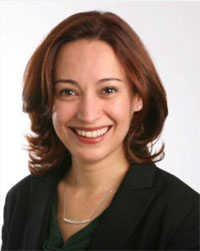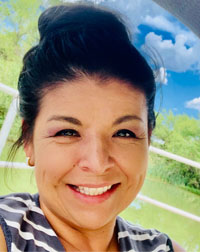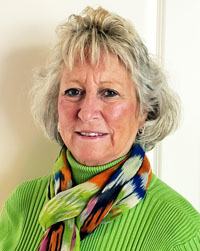Faces of Rural: Redefining who we are
“That’s when I saw the difference between what kinds of care I had available in my suburban life versus Pine Ridge,” Tanaka says. “It spurred my interest in public health issues and how to address them in a systemic way. When I saw the health care differences due to geographic location, I felt like I needed to do something to address that inequity.”
.jpg?width=921&ext=.jpg) |
| Mina Tanaka |
Nearly a decade later, Tanaka practices full-spectrum internal medicine at Northern Navajo Medical Center in Shiprock, N.M., where she works with the Indian Health Service doing both inpatient and outpatient care. Over the years, she has been surprised and charmed by rural life – and she has found that small communities have unique strengths that help them survive and thrive.
“The thing that struck me the most when I moved here in 2021 is the immense sense of solidarity and connectedness between community members,” Tanaka says. “Because of that interconnectedness, there’s a deep understanding that individuals have a responsibility to each other to keep the whole community healthy.”
|
"I’m so proud of the intellectual curiosity that my colleagues and I nurture in our practice." – Mina Tanaka |
Across the country, health care providers are helping shift the rural narrative, eagerly noting that their communities are diverse, innovative, welcoming, and resilient – often different than what urban and suburban dwellers expect. NRHA will continue to highlight these empowering voices in our ongoing Faces of Rural Campaign.
“The rural reality is far different than what has always been depicted, and NRHA looks to change this narrative,” says Amy Elizondo, NRHA chief strategy officer. “Rural America is constantly evolving in culture and community, and NRHA’s Faces of Rural campaign showcases diverse communities and programs that exemplify the heart of rural communities.”
 |
| Amy Elizondo |
Rural communities are diverse
Many rural stereotypes are perpetuated by the media, where residents are often portrayed as predominantly white and agricultural. In actuality, small-town folks come from a wide variety of cultural, racial, and ethnic backgrounds. Along the United States-Mexico border, the New Mexico Department of Health provides health education, harm reduction, clinical services, WIC education, and outreach for individuals from eight rural counties in the southwestern part of the state, where the demographics look different than most of the country. |
| Angie Corral |
“Our rural community is different from what most people stereotypically perceive a small town to be because we are mostly of the Hispanic culture,” says Angie Corral, New Mexico Department of Health Office of Border Health community development coordinator. “Dozens of residents run small businesses and participate in the local fairs and markets, which allows us to not only maintain our local economy but develop connections. This helps us relate and gain trust with each other.”
In rural Warsaw, Ind., Affiliate Service Providers of Indiana (ASPIN) also serves a diverse clientele. The organization has provided safety net mental health and addiction services, Medicaid and Marketplace insurance enrollment assistance, and community health worker (CHW) trainings in all 92 counties since 1995, with the ASPIN Health Navigator program funded entirely through a CMS/HHS cooperative agreement.
| "Trust is built already within the community, so during hard times they don’t have trouble helping one another." – Angie Corral |
According to ASPIN CEO and one of its founders Kathy Cook, the affordable cost of living in Indiana draws many immigrants to the state. As a result, her organization has served more than 3,000 consumers in languages other than English, comprising more than 43 different languages. To reach the folks who need their help, ASPIN navigators/CHWs meet people wherever it is most convenient for them.
“We have health navigators who help consumers and individuals throughout Indiana,” Cook says. “We offer free assistance with health insurance and Medicaid statewide. We also do outreach in rural communities. We have bilingual navigators and a language translation service. And we meet people where they’re at – I’ve had navigators meet people at truck stops to help enroll them. They go to churches, libraries, farmers markets, local diners, even community baby showers.”
.jpg?width=921&ext=.jpg) |
| ASPIN health navigators exhibit at community events to reach rural residents. |
As someone who spent the first part of her life in cities, Tanaka was initially surprised by the diversity in her rural region. She now encourages other health care providers who are considering rural practice to learn more about who really lives in an area before making potentially harmful assumptions.
“When people think about working in the country, they assume it will be very homogenous,” she says. “They are concerned it will be predominantly white – and I’ve heard that concern from both white people and people of color. But that is not the case. There is also a lot of religious and political diversity in my immediate area and the surrounding towns.”
Rural communities are resilient
Many rural communities endure common barriers to health care access and well-being, such as a lack of transportation or health insurance, limited resources, lower rates of health literacy, and lower incomes. But small-town health care providers and residents also possess advantages that help them work together to overcome the challenges they face. Corral says her organization focuses on door-to-door outreach to make people aware of the services they offer – and having all of the services in a single location helps with ease of access. Established community relationships with CHWs also help reach new patients.“Trust is built already within the community, so during hard times they don’t have trouble helping one another,” Corral says. “Being familiar and comfortable with those you are helping and being helped by is beneficial to the client as well as the provider/CHW. That is something only a small rural area with so much interconnectedness could offer.”
 |
| Kathy Cook |
At ASPIN, Cook says they also rely on CHWs to help people in the community connect with resources, find doctors, and enroll for health insurance or Medicaid. Over the last 15 years, ASPIN has trained approximately 1,800 CHWs nationwide and received several HRSA grants that have allowed them to offer free online trainings in English and Spanish. This not only helps the organization meet its immediate employment needs but also helps build a workforce pipeline for the future.
“People can do the training in their local community, and there’s a lot of opportunity for them moving forward,” Cook says. “It keeps them in the rural community to help with workforce shortages. We try to encourage hospitals and health centers to look at people who haven’t had the opportunity to go on to college to enter the CHW profession because it’s very rewarding – and it gets them on the pathway to other health care careers.”
| "There are people who were using all of their money on prescription drugs who can now afford to buy food because they have health insurance" – Kathy Cook |
For Tanaka, pursuing a rural health care career has indeed been a rewarding choice, both for the intellectual challenges and personal fulfillment she finds in managing her patients’ care. In the city, she functioned more as a care coordinator who referred her patients out to specialists as needed – but in a rural area, she has been able to take more ownership of the care of her patients while integrating input from specialists as needed.
“In a rural setting I have responsibility for doing legwork on my own because I don’t always have access to specialists,” Tanaka says. “It has expanded my mind, my clinical acumen, and my confidence. We are resourceful in a way that would be helpful for other providers. I’m so proud of the intellectual curiosity that my colleagues and I nurture in our practice. At work I feel very fulfilled in the mind and in spirit.”
Rural communities are proud
As rural narratives and demographics shift, one thing remains the same: The people who live and work in small towns are deeply passionate about their culture and community. This seems particularly true for health care workers, who often double as advocates and educators in their quest to achieve optimal wellness for their patients, friends, and neighbors. For Cook, offering free education has been essential to helping people in her community further their careers and maintain their health.“I’m proud that we make a positive difference in people’s lives every day,” she says. “We’ve changed a lot of people’s lives. There are people who were using all of their money on prescription drugs who can now afford to buy food because they have health insurance. It’s amazing the number of people out there who need help.”
.jpg?width=921&ext=.jpg) |
| Health navigators help residents connect with resources, enroll for health insurance, and more. |
Corral is also pleased with what her organization is able to accomplish through the success of their CHW program. She credits the New Mexico Department of Health with giving staff the resources they need to have an effective outreach program to help their community.
“There is clear evidence of the changes we are making in our community and how beneficial those changes can be overall,” she says. “The organization has done a great job organizing and providing the information and services that the community needs, as well as having programs and providers communicate with one another to ensure that each community member receives the services and support they require.”
| "NRHA’s Faces of Rural campaign showcases diverse communities and programs that exemplify the heart of rural communities" – Amy Elizondo |
Tanaka also cites meaningful partnerships with rural patients as essential to her organization’s success. As a health care provider, she aims to let patients know they are all on the same team and create a culture of compassion through trauma-informed care, which she says is a major strength of her rural practice.
“Our mission is to get people on the path to health, even if that path has a lot of detours,” she says. “I want everyone who receives care here to feel like we have their best interests at heart and like we’re all in this together.”
